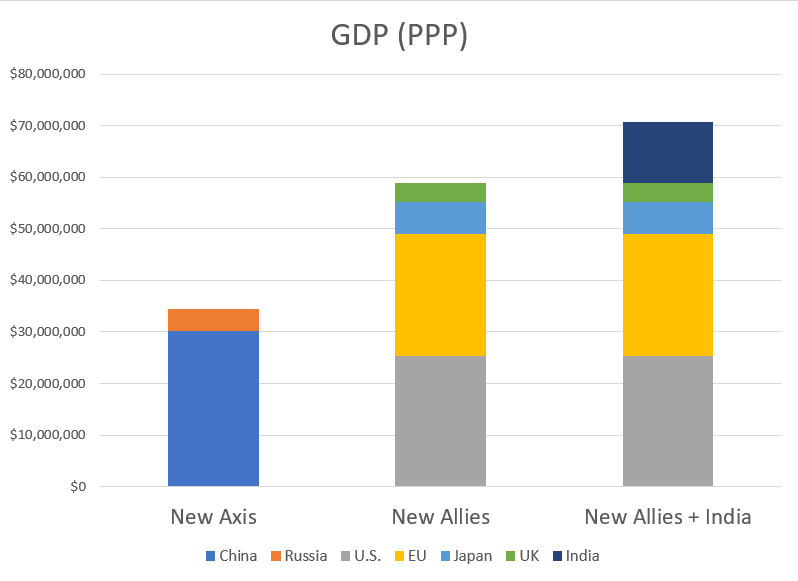It's not Taiwan or bust
The actual strategic challenge facing the US vis a vis China isn't defending Taiwan, it's creating the diplomatic, economic and military architecture needed to compete with China over the long-term.
There is a breed of thought in the national security environment, typically offered by realists, that argues that the US commitment to supporting Ukraine is risky because the US’s main priority must be deterring China from taking military action against Taiwan. This argument has its logic and many of the concerns its supporters offer around limitations in the US defense industrial base and mobilization capacity are sound. However, I have concerns that the focus on preparing for a military confrontation with China that may never come at the expense of diplomatic solidarity with our most loyal set of allies in Europe is a risky proposition. Fundamentally, we do not know if or when China might choose to attempt an invasion or what balance of forces would prompt it to do so.
What we can be certain of is that, regardless of any military action around Taiwan, we are in a long-term competition with China for what model of governance should manage the world. That competition is the crucial one and it is not one that can be won through unilateral action. Instead, the real strategic challenge is going to be piecing together what is currently a very disparate coalition in order to have the economic, diplomatic, and military resources needed to compete with China over the long term. When placed in that light, the decision as to how to manage prioritization between Taiwan and Ukraine becomes more complex and the administration’s decision to buttress Ukraine is much more understandable.
The basic line of argument of China hawks/realists on this score is as follows. First, China is by almost any reasonable set of metrics the clear pacing threat to the US’s position as the leading nation in the world. Second, that containment of China is crucial to maintaining the relative position of the two nations. Third, that our existing commitments combined with the above make the defense of Taiwan a national security priority. Fourth, they believe that a Chinese attack on Taiwan is, if not imminent, likely to occur within the decade. Lastly, they generally (and in my view rightly) highlight the vast challenges facing any attempt to defend Taiwan given our current force composition, force deployment, and mobilization/force regeneration capabilities.
Based on all of the above, they argue that our ongoing, and slowly expanding, commitments to support Ukraine are a clear risk to our position vis a vis China. The loss of precision munitions, focus, and resources caused by our intervention reduces, in their telling, in equal measure, our preparations in east Asia. I think there is reasonable room to debate this - the resources deployed to Ukraine may or may not be of equal utility in the very different operational conditions of stopping an invasion of Taiwan, but broadly I’m generally willing to concede some version of this point. A Stinger used up hitting a Russian SU-35 can’t be used on a PLAF J-10.
However, I think the framing of the prioritization is wrong. Regardless of whether or not China attacks Taiwan (and there is no certainty that this will take place), we will remain in a long-term competition with China that will likely last decades. This competition will be similar to the Cold War in that it will be a worldwide contest for influence, economic, social, and military primacy. Unlike the Cold War, we will not have the same preponderance of economic capability, meaning that any successful strategy for winning this competition will lean heavily on allied capabilities. Noah Smith has produced a very useful chart in this regard:
This chart puts in very sharp relief the importance of maintaining cohesion with our allies when it comes to facing China. Simply put, in a long-term competition we are at a competitive disadvantage should we choose to go it alone and attempt to compete with China.
There is considerable literature out there on this, so I’m not going to dive into it, but in the Cold War, the primacy of American economic power made our model significantly more attractive to many neutral countries. However, in the modern world, China is a much bigger player in trade and influence in the most rapidly growing parts of the world than the United States. Similarly, China is already fielding extremely competitive military forces while spending a smaller share of GDP than we are, giving it space to grow should competition heat up. Given their larger PPP economy, it is reasonable to infer they can outspend the United States on military equipment should they so desire.
The end result of all of this is that the United States will need to lean much more heavily on its allies than it has done in the past if it wishes to succeed in competing with China. That means bringing along countries that may not share our priors or our priorities in all cases in order to successfully build a diplomatic, economic, and military architecture oriented towards competing with China.
In this light, the decision to continue to support Ukraine makes far more sense. Many of our European allies do not share our avidity for accurately assessing that China wishes to supplant the current liberal order with one centered on its own ideological constructs. Deepening and sustaining our mutual commitments in Ukraine can serve as a path toward bringing them closer to a more unified position with the US relative to China. Given that we will be competing with China for quite some time, regardless of whether they attack Taiwan or not, this alliance building is of paramount importance.
(I’ve made an update to this post to remove a particularly egregious typo.)




